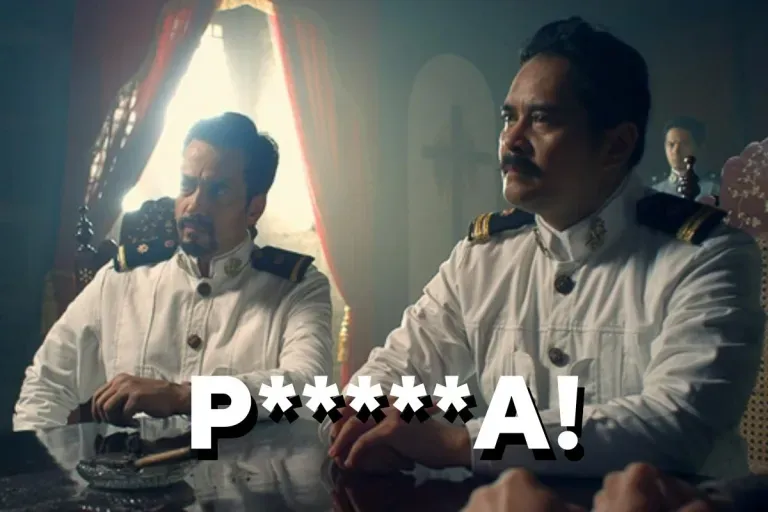Our favourite places to stay on this sleepy Cebu island.
7 Filipino Curse Words That Actually Have Spanish Origins

The Spaniards sure left a lot of history and culture in the Philippines. More than 300 years worth of it, in fact. As such, it comes naturally for Filipinos to have embedded the nuances of their language ever since. From the way we count our money to the names of our food, several Spanish-influenced words have been a part of our lives. And you know its influence is deep when the language is incorporated into the vernacular — through cursing and swearing — like it’s nothing.

That said, this list may provide some context about the curses and swears you might hear from the common folk. You may have heard some of these before, but it may interest you how they came to be.
Filipino curse words with Spanish origins: from bad to worse
1. “G*go”
I hear this word almost on a daily basis. In Spanish, the word gago actually means “stuttering” or “stammering.” Historically, it was used to describe someone as a slow learner. Filipinos have adapted to the idea ever since. It has a myriad of uses, from daily absurdities, in jest, and of course, rage.
Its Spanish origin makes the word gender-specific as well. It is probably because it sounds a bit playful and clumsy, but gaga doesn’t have the same potency as the male-specific counterpart.
Also read: Filipino Expressions We Can’t Help But Say When Travelling Abroad
2. “In*til”
This word directly translates to “useless.” Today, it is used for something as mild as a task failure; in worst cases, to highlight the growing disparity between social classes. It’s a pretty mean word, and I don’t think it ever lost its potency.
3. “B*bo”
This word sounds funny, but it is always jarring to hear out in public. This is another direct translation of a Spanish word that also means “stupid” or “fool,” to no one’s surprise. I have no idea how demeaning it was during the colonial period, but it has very distressing implications now. Recently, it seemed that seeing this word on every social media thread had no end because of the vitriol induced by this year’s Philippine national elections. It has certainly brought an ugly side to browsing social feeds.
4. “Pun*eta”
This Spanish word is used to simply express annoyance in general but has since taken shape into something more definitive. If you want to think of a similar word, the English language gives us “a**hole” or “wanker” from the United Kingdom. Like the previous example, this word gained notoriety when it was used as the favoured expression by John Arcilla’s Heneral Luna in the film of the same name.
5. “Hudas”

I tend to think that this is a literal curse out of all the words on this list. Because let’s face it, no one wants to be called Judas. As most Spanish words sound, words that start with the letter j are replaced with an h sound. It has thus become the Filipino pronunciation as well.
This word shares the same meaning as its English counterpart, which labels someone as a traitor or a distrustful person.
6. “L*che” or “L*tse”
Tracing the origin of this swear word is a bit complicated. After all, this word in Spanish means milk. Sounds pretty harmless, right? Apparently, this was derived from a Spanish expression, “me cago en la leche,” which means “I defiled your milk.” Apologies for the truth bomb.
7. “P*tang ina”
We’ve now arrived at the final boss of Filipino curse words, if you will. In Spanish, the first word (the one that starts with the letter p) means prostitute. The second word is Filipino for mother. Putting them together can mean either “son of a b*tch” or “bastard.”
The word is also known throughout the world through President Rodrigo Duterte’s generous use of it in his speeches and addresses.
Also read: Filipino Words That Have Spanish Origins That Filipinos Don’t Normally Know About
If you can’t tell, this was an awkward and tough article to write, even for someone who swears like a sailor probably every weekend. But the act is confrontational in nature; what more researching about its colonial history. Disturbing as these Filipino curse words are, learning about their origins can be important lessons in understanding how modern Filipino society functions.
One thing’s for sure, I need a drink or two after writing this.
Featured image credit: Heneral Luna (2015) | IMDb
Published at
About Author
Aldous Vince Cabildo
Subscribe our Newsletter
Get our weekly tips and travel news!
Recommended Articles
10 Bantayan Island Resorts, Hotels, and Rentals for Your Tropical Escape 14 Best Credit Cards for Travel in the Philippines The only plastic we need for travel.
10 Best Mountain Cafes in the Philippines for Your Peak Coffee Experience Coffee date on the mountains, anyone?
10 Fairytale Castles In Europe Filipinos Need To See! Permission to feel like royalty even for a day?!
10 Fun Things to Do in Manila Alone Live your best life in Manila, even when you’re riding solo.
Latest Articles
AirAsia Philippines Launches Affordable Summer Food And Drinks On Board Summer Feels Onboard AirAsia!
Budget Travel Tips for Siargao Smart ways to save in Siargao
10 Philippine Destinations Nominated at the 2025 World Travel Awards Discover the top 10 destinations nominated for the 2025 World Travel Awards.
Best Places to See the Northern Lights in 2025 Top aurora spots and tips
10 Proven Ways to Score Cheap Flights Fly smarter without breaking your budget!

